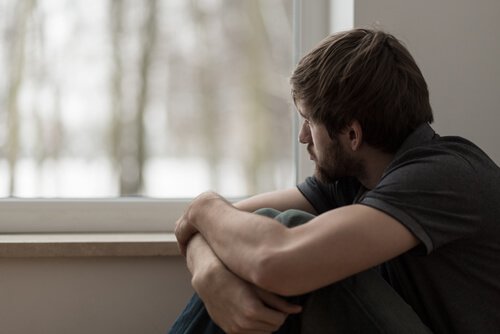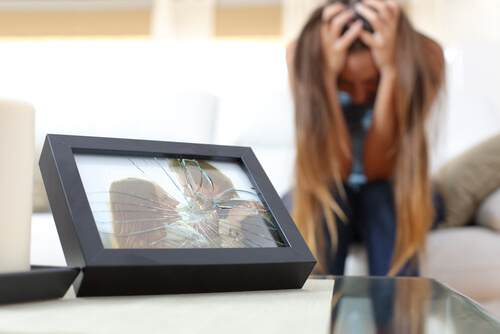What are the Stages of Pain After a Breakup?


Written and verified by the psychologist Julia Marquez Arrico
When am I going to be okay? How can I go from sadness to rage so fast? These are the questions people ask as they go through the stages of pain after a breakup. A breakup and the pain it brings with it are some of the most common reasons adults seek psychological help.
After a breakup, people go through different stages and different flavors of pain. In this article, we’ll explain what the stages of pain after a breakup are, and what they’re like.
Stage 1: State of shock
This is the beginning of the pain. In this stage, the person still can’t believe it. It’s hard for them to be conscious of the breakup, and see what their new situation is. Emotionally, during the shock stage there’s a lack of reaction. The person acts like nothing happened, life as usual.
The denial stage is much more noticeable in people who’ve been “left.” It’s less noticeable in the people who “have left.” What’s happening is that, whoever decided to break things off has already gone through the denial and shock stage. So, the one who takes the step to break things off has already worked through the new situation, and isn’t in denial.
Once they’ve opened their eyes to the breakup and can visualize what’s coming next, then comes the next stage: denying the loss.
“The denial stage is more noticeable in people who’ve been “left.” It’s less noticeable in the people who “have left.”

Stage 2: Denying the loss
Within the stages of pain after a breakup, we find denial. With this one, the person is aware of what they’ve lost, but they don’t want to accept it. They refuse to accept that the relationship is over, and instead fantasize about being in it again. One typical example of this stage is entertaining the idea that the breakup might have been a mistake or a rash decision.
A mind in the denial stage focuses on finding ways to solve the problems and pick up the relationship. This stage has an adaptive function. It gives you time to “digest” the loss, and helps you keep on going with work and obligations. Little by little, you become aware of the changes that have already happened, and will happen.
Stage 3: Deep sadness
During this stage, they start to accept and experience what the breakup means for them. The person starts to be aware of how their life has changed and will go on changing. And that’s what creates such deep sadness. It comes accompanied by a negative way of seeing the world, the future, and themselves.
What’s typical of this stage is a psychological function in line with Beck’s cognitive triad. So that’s where the deep sadness and symptoms of depression come from. Sadness is a necessary emotion for you to truly accept the loss. And it will help you connect with what happened and start to overcome the pain little by little.

Stage 4: Blame
Of the stages of pain after a breakup, the blame stage is one of the most typical. That is, blame doesn’t come up so noticeably when with other kinds of pain. But after the pain of a breakup, this is one of the most notorious and complicated stages we face.
Blame makes you obsess over what you could have done or said that would’ve saved the relationship. Brooding and obsessively thinking about what caused the breakup can psychologically wear out the person and create serious anxiety.
Taking 100% of the blame for a breakup is counterproductive. And, above all, it’s very unfair. Couples are a team made up of two people, and the responsibility for a breakup is always shared. Try to spread out the blame you feel. See it as a shared responsibility and direct your mind towards the future.
Stage 5: Anger
Once you stop feeling like it was all your fault and can share the blame for everything that happened, you’ll start to feel angry. The anger stage is the most “beneficial” or “positive.” This is because when someone or something makes us angry, we avoid it and try to get it out of our lives. And all this after a breakup…it’s perfect!
Why is anger the best thing that can happen to you when you’re in pain after a breakup? Because anger, well directed, is a very powerful force. In the first place, it keeps you far from the person you’ve lost and that’s fundamental for getting better.
Being in contact with an ex during the stages of pain gets people stuck in the stage of blame or sadness. That will make it hard for them to move forward.
In the future you might be able to be friends, but not when you’re still in pain. So anger helps a person stay far away from the people hurting them. Use your anger to improve your personal state, to think more about you and take care of yourself. But…be careful! Don’t get stuck in this stage. If you do, the same rage that protected you will turn against you.

Stage 6: Acceptance
If you’ve experienced and appropriately used anger, you can move onto the acceptance stage. The emotions in this stage aren’t completely positive or gratifying. They’re emotions that help you see what happened as part of the story of your life. It comes with all its ups and downs.
“Blame makes you obsess over what you could have done or said that would’ve saved the relationship.”
People in the acceptance stage start to come to terms with what happened. They start to think about themselves and focus their mind on the future, not on the past or the loss. Acceptance is the definitive path to getting better after a breakup. It helps us think about creating a future by and for ourselves.
Lastly, it’s important to remember that the stages of pain after a breakup aren’t linear or correlative. This is something we notice especially at the beginning of the pain. That is, the more recent the loss, the more changeable are the stages of pain. You can go from stage 1 to 3, and then from 2 to 4.
As long as you work through the loss and live through the pain, you’ll see how you’ll take fewer steps backward, and more steps forward. You don’t feel as insecure anymore, and you start to look at the future with new eyes.
When am I going to be okay? How can I go from sadness to rage so fast? These are the questions people ask as they go through the stages of pain after a breakup. A breakup and the pain it brings with it are some of the most common reasons adults seek psychological help.
After a breakup, people go through different stages and different flavors of pain. In this article, we’ll explain what the stages of pain after a breakup are, and what they’re like.
Stage 1: State of shock
This is the beginning of the pain. In this stage, the person still can’t believe it. It’s hard for them to be conscious of the breakup, and see what their new situation is. Emotionally, during the shock stage there’s a lack of reaction. The person acts like nothing happened, life as usual.
The denial stage is much more noticeable in people who’ve been “left.” It’s less noticeable in the people who “have left.” What’s happening is that, whoever decided to break things off has already gone through the denial and shock stage. So, the one who takes the step to break things off has already worked through the new situation, and isn’t in denial.
Once they’ve opened their eyes to the breakup and can visualize what’s coming next, then comes the next stage: denying the loss.
“The denial stage is more noticeable in people who’ve been “left.” It’s less noticeable in the people who “have left.”

Stage 2: Denying the loss
Within the stages of pain after a breakup, we find denial. With this one, the person is aware of what they’ve lost, but they don’t want to accept it. They refuse to accept that the relationship is over, and instead fantasize about being in it again. One typical example of this stage is entertaining the idea that the breakup might have been a mistake or a rash decision.
A mind in the denial stage focuses on finding ways to solve the problems and pick up the relationship. This stage has an adaptive function. It gives you time to “digest” the loss, and helps you keep on going with work and obligations. Little by little, you become aware of the changes that have already happened, and will happen.
Stage 3: Deep sadness
During this stage, they start to accept and experience what the breakup means for them. The person starts to be aware of how their life has changed and will go on changing. And that’s what creates such deep sadness. It comes accompanied by a negative way of seeing the world, the future, and themselves.
What’s typical of this stage is a psychological function in line with Beck’s cognitive triad. So that’s where the deep sadness and symptoms of depression come from. Sadness is a necessary emotion for you to truly accept the loss. And it will help you connect with what happened and start to overcome the pain little by little.

Stage 4: Blame
Of the stages of pain after a breakup, the blame stage is one of the most typical. That is, blame doesn’t come up so noticeably when with other kinds of pain. But after the pain of a breakup, this is one of the most notorious and complicated stages we face.
Blame makes you obsess over what you could have done or said that would’ve saved the relationship. Brooding and obsessively thinking about what caused the breakup can psychologically wear out the person and create serious anxiety.
Taking 100% of the blame for a breakup is counterproductive. And, above all, it’s very unfair. Couples are a team made up of two people, and the responsibility for a breakup is always shared. Try to spread out the blame you feel. See it as a shared responsibility and direct your mind towards the future.
Stage 5: Anger
Once you stop feeling like it was all your fault and can share the blame for everything that happened, you’ll start to feel angry. The anger stage is the most “beneficial” or “positive.” This is because when someone or something makes us angry, we avoid it and try to get it out of our lives. And all this after a breakup…it’s perfect!
Why is anger the best thing that can happen to you when you’re in pain after a breakup? Because anger, well directed, is a very powerful force. In the first place, it keeps you far from the person you’ve lost and that’s fundamental for getting better.
Being in contact with an ex during the stages of pain gets people stuck in the stage of blame or sadness. That will make it hard for them to move forward.
In the future you might be able to be friends, but not when you’re still in pain. So anger helps a person stay far away from the people hurting them. Use your anger to improve your personal state, to think more about you and take care of yourself. But…be careful! Don’t get stuck in this stage. If you do, the same rage that protected you will turn against you.

Stage 6: Acceptance
If you’ve experienced and appropriately used anger, you can move onto the acceptance stage. The emotions in this stage aren’t completely positive or gratifying. They’re emotions that help you see what happened as part of the story of your life. It comes with all its ups and downs.
“Blame makes you obsess over what you could have done or said that would’ve saved the relationship.”
People in the acceptance stage start to come to terms with what happened. They start to think about themselves and focus their mind on the future, not on the past or the loss. Acceptance is the definitive path to getting better after a breakup. It helps us think about creating a future by and for ourselves.
Lastly, it’s important to remember that the stages of pain after a breakup aren’t linear or correlative. This is something we notice especially at the beginning of the pain. That is, the more recent the loss, the more changeable are the stages of pain. You can go from stage 1 to 3, and then from 2 to 4.
As long as you work through the loss and live through the pain, you’ll see how you’ll take fewer steps backward, and more steps forward. You don’t feel as insecure anymore, and you start to look at the future with new eyes.
All cited sources were thoroughly reviewed by our team to ensure their quality, reliability, currency, and validity. The bibliography of this article was considered reliable and of academic or scientific accuracy.
- García, F. & Ilabaca, D. (2013). Puptura de pareja, afrontamiento y bienestar psicológico en adultos jóvenes. Ajayu Órgano de Difusión Científica del Departamento de Psicología UCBSP, 11(2), 42-60. http://www.scielo.org.bo/scielo.php?script=sci_arttext&pid=S2077-21612013000200003&lng=es&tlng=es
This text is provided for informational purposes only and does not replace consultation with a professional. If in doubt, consult your specialist.







